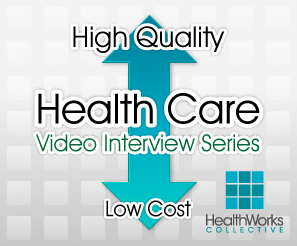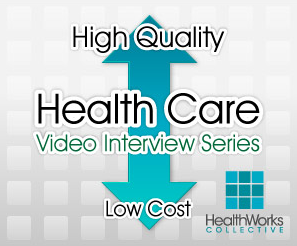

Following is an interview with Dr David Arterburn of Group Health Research in Seattle, Washington. Dr Arterburn and his team have implemented Decision Aids that help patients make important choices about medical and surgical procedures. They have also done a study showing that these Decision Aids reduced costs for the hospital. You can read more about decision aids and the study here.
If you have a story to tell about reducing costs and raising the quality of healthcare, please comment below or email me at joan@socialmediatoday.com
Video transcript (by transcriptionstar)
Joan: Hello. I’m Joan Justice from HealthWorks Collective, and I’m here today with Dr. David Arterburnfrom Group Health Research in Seattle Washington. Arterburn and his team have implemented some informational decision aids for patients and this has been shown to increase patient satisfaction while reducing cost for the hospital.
David, could you please tell us what is a decision aid? When do you suggest patients employ these aids and tell us a little bit about the cost savings study at Group Health and what the results were?
David: Sure. Thank you, Joan. So decision aids are really enhanced educational materials for patients that are [avenue] space. They present both the benefits and the risks of different treatment options or different medical decisions that patients face routinely and in clinical care, and they help patients understand interest and benefits and the other piece that they do is help patients to understand that their own personal preferences are the things that should really guide their decisions, so these decision aids are best used in the types of treatment decisions where there’s no one right choice, so we’re not talking about things like should I take aspirin or something like that after having a heart attack. That’s effective care.
We know the vast majority of patients should take those types of medications after heart attack and that’s a different class of treatment and then preference sensitive care which is where there’s more than one option. There’s different risks and benefits for each of those options and when it comes down to is the patients own valuation of those different risks and benefits of the different options is what should really drive the patient decision and as you mentioned at the outset what we found is that by implementing these decision aids and clinical care that patients reported very high satisfaction with the tools, so they were more than 95% of our patients reported back to whereas that they were here excellent, very good or good making them well-informed to have conversations with their providers.
And the similar proportion that patients said I would really like to have these for other treatment decisions that I was facing. And so we find that their dying patients and then our treatment, our recent study of knee and hip replacement found that once we implemented these patient decision aids and worked with providers to understand how to use them in the clinical care and began using them regularly that the rates of knee and hip replacement went that down, and that our total cost of care for patients with knee and hip osteoarthritis went down as well.
Interviewer: Okay and what about the patients that were told that they had to have or should have this knee or hip replacement surgery and then one might say that oh, well they opted not to, but maybe at a later point in time they would have to have it anyway what would be the argument there. I’m just playing devil’s advocate here.
Interviewee: Sure well, there’s a 86 randomized trials that have been done in the patient decision aids to day which show that patients are more knowledgeable about their treatment choices after viewing a decisions aid, and so we believe although we didn’t collect knowledge data on our patients. Patients are making better informed choices with their providers than they were before we started using the patient decisions. So, now that we’re using them we think that patients are making choices that are in alignment with their own preferences and their own knowledge of the different risks and that that’s where I were using them.
They may have been a number of patients in our health system who are electing to have surgery. We have decided to be the delayed surgery or choose some other kind of treatment option in the short term to reduce the risks where they try to improve their health in other way even through weight loss or other medications or physical therapy.
We think a large number of patients might have chosen that if they have been better informed and so under our new use of the patient decision aids to support share decision making with providers. I don’t — I think what we have a better informed patients making choices that are better aligned with their own preferences they may still choose later on that they would really like to have surgery, and so were the goal is not to reduce surgery. It’s to make patients well-informed so that they choose the right rate of surgery for them.
Interviewer: Okay that sounds really good. And how many decision aids do you implement at the current time?
Interviewee: We have 12 decision aids related to the elective surgical procedures that are in six different specialty groups at Group Health.
Interviewer: Okay well, that sounds wonderful. I think the fact that the patients can be informed and they make their own decision with the help of these decision aids. A course like you said they just feel that they’re participating more in their healthcare and they’re happier so I would thank you so much for this idea and we can see how this patient-centered decision aids can really help patients actively participate in their treatment and make these informed decisions which raises the quality of their care and increases patients satisfaction and also reduces cost, and thank you so much for this.
Interviewee: Thank you Joan.






